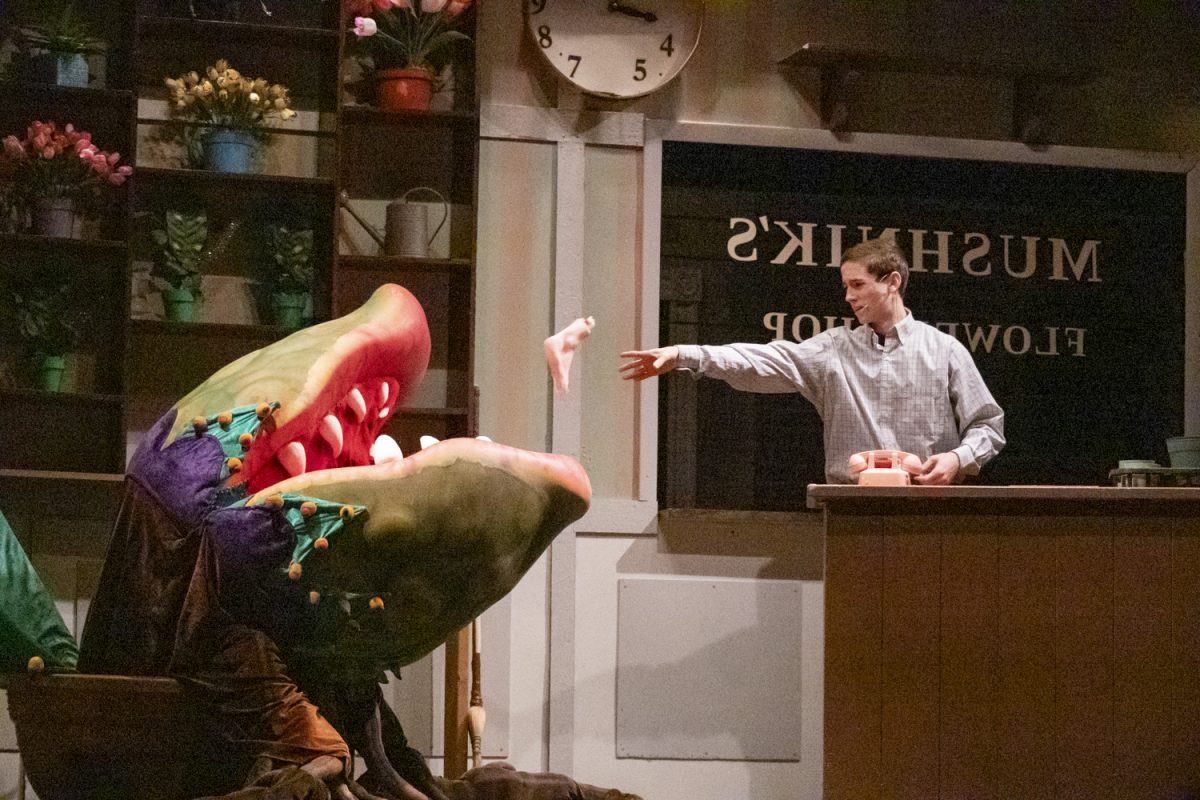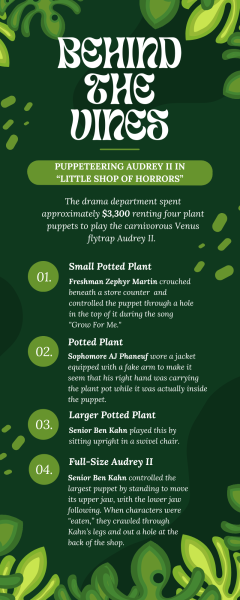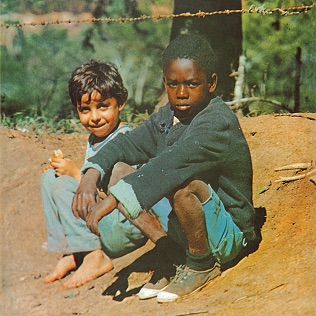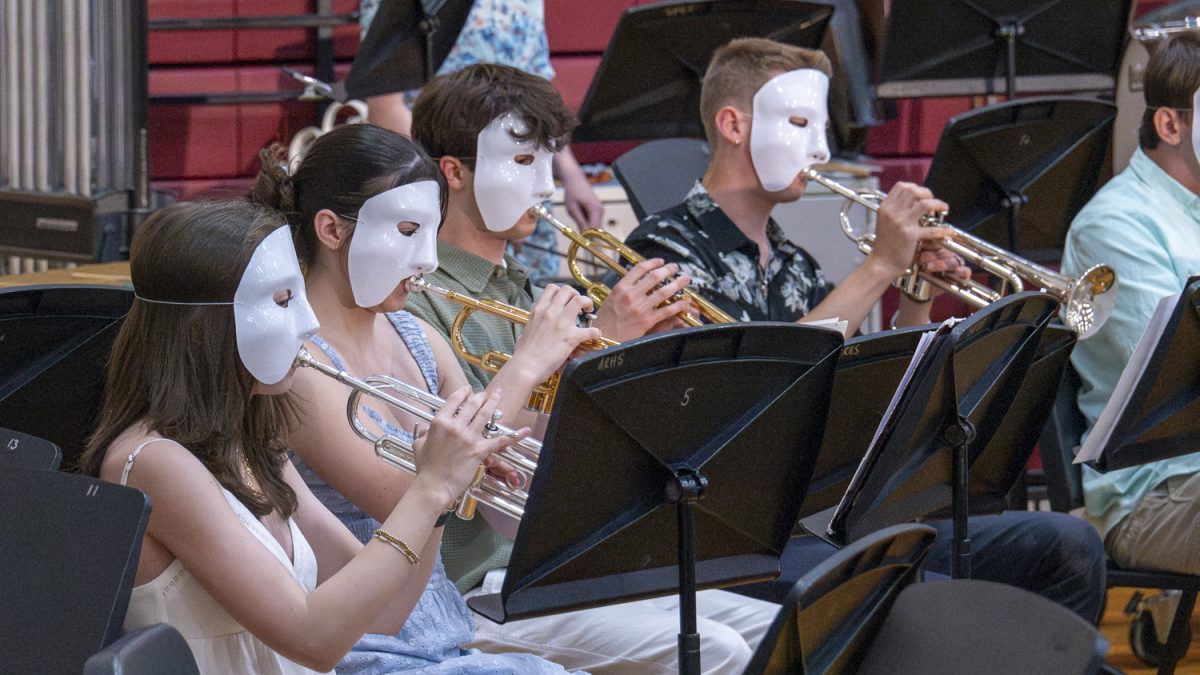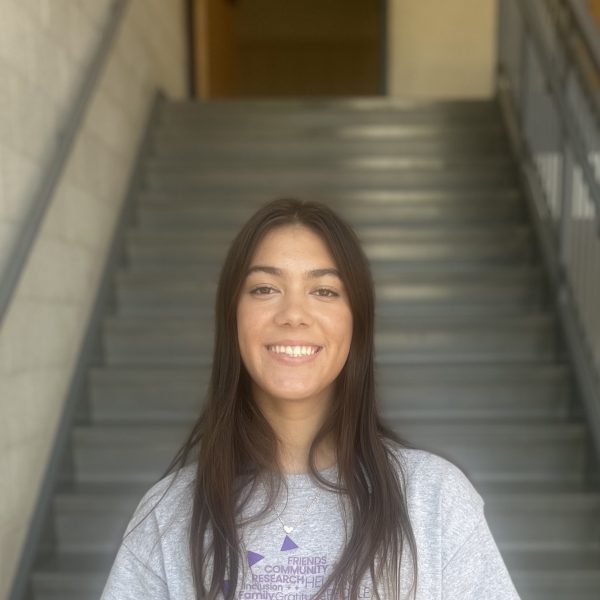A carnivorous venus fly trap took center stage during the performances of “Little Shop of Horrors” from Thursday Nov. 21 to Saturday Nov. 23. The musical captivated audiences with its blend of intricate props and a talented cast, bringing complex emotions to life in a visually stunning production.
Since auditions began during the first week of school, the cast and crew were hard at work. Director and Science teacher Brian Kelly has been directing productions for over 20 years and recognizes the special aspects of the show.
“This musical is unique because it involves a whole different skill set for some of the actors on stage,” Kelly said. “This show has giant puppets involved that the actors have to run. I like to think of it as having real human characters with real human emotions who face real human experiences.”
The largest puppet is a six-foot-long blood-thirsty venus fly trap. Voiced by senior Lydia Reineke and controlled by senior Ben Kahn, Kelly spoke to the difficulties that accompany playing such an eccentric part while still maintaining the human emotions integral to the plant’s character.
“They’re not caricatures of themselves; they had to actually learn how to put themselves in those emotions,” Kelly said. “It’s challenging for young actors.”
Despite the difficulties, the actors rose to the task.
“They’ve been working really hard to make sure things are realistic,” Kelly said while the production was in rehearsals. “They’ve been allowing me to be very detailed in giving them instructions, and they’ve just been responding with good humor. They formed really good relationships with each other too, on and off the stage.”
Set design adviser Dan Strickland praised the students’ hard work and dedication, highlighting their efforts in every detail. From painting hundreds of bricks to create a realistic storefront, to extending the length of the stage for more space, to ensuring the set transforms throughout the show — from dilapidated and rundown to fresh and polished — the set crew played a crucial role in elevating the production.
“All the students have been very much involved with every part and every aspect of the design,” Strickland said. “[They] come in every day after school and work on that.”
Strickland also recognized the significance of the elaborate puppets.
“It was kind of cool when we got [the puppets] delivered to see them for the first time; it’s a very big part of the show,” Strickland said. “The students get a taste of what it’s like to do [professional] theater because it’s pretty similar to the ones that were used for the main productions when these were on Broadway.”
Perhaps no one is as well versed in the puppets as Kahn, the puppeteer in charge of controlling the two biggest plants. The plant transforms over the course of the show, starting as a smaller version operated by freshman Zephyr Martin, then transitioning to a handheld puppet managed by sophomore AJ Phaneuf, before ultimately becoming a much larger puppet controlled by Kahn.
“It’s just a matter of putting in the time to get used to it,” Kahn said.
Outside of the unique puppets, a new stationary set was adopted. Instead of the set changing in between scenes, the majority of the musical took place in the plant shop. Assistant stage manager senior Ellie Titus understands how this variation from the past makes it both easier and harder to transition between scenes.
“The main shop stays put in the middle, which is different because usually everything is moving,” Titus said. “We have to make sure that we avoid hitting the big thing. We also have to move the things that move around [the set], which makes it a little tricky in that regard.”
One of the biggest challenges this year had been the access to the stage itself. According to Peters, the majority of the rehearsals had taken place in the Black Box so the adjustment to the auditorium stage was difficult.
“Now that we are on the stage with the set, there are a lot of things that are not going the way they went in the Black Box because we have a different space,” Peters said.
Peters believes that this musical will lead to more interest from younger crowds because it is more modern than those done in the past, such as “Guys and Dolls.”
“There are still aspects of [the musical] that are very intriguing to people our age,” Peters said.
Additionally, both the cast and crew adopted a new approach to completing certain tasks that needed to be completed before the curtains opened. Junior Izzie Gaskamp, head of sound, believes that in previous years, procrastination often led to high levels of stress. However, this year, they worked on tasks ahead of schedule.
“We need to mark up the script and write the numbers in for when different microphones need to be turned on and off,” Gaskamp said. “Usually, we’d start doing that literally the week of the show and then we’d be rushed.”
Gaskamp has seen the dedication of her fellow crew members to make the show as successful as possible and is eager to see the end result of all their hard work.
“I think it’s a really fun show, and I’m really excited just to see it all play out on stage,” Gaskamp said a couple weeks before the show opened. “All the cast and crew has been working super hard, and it’s going to be really great.”



